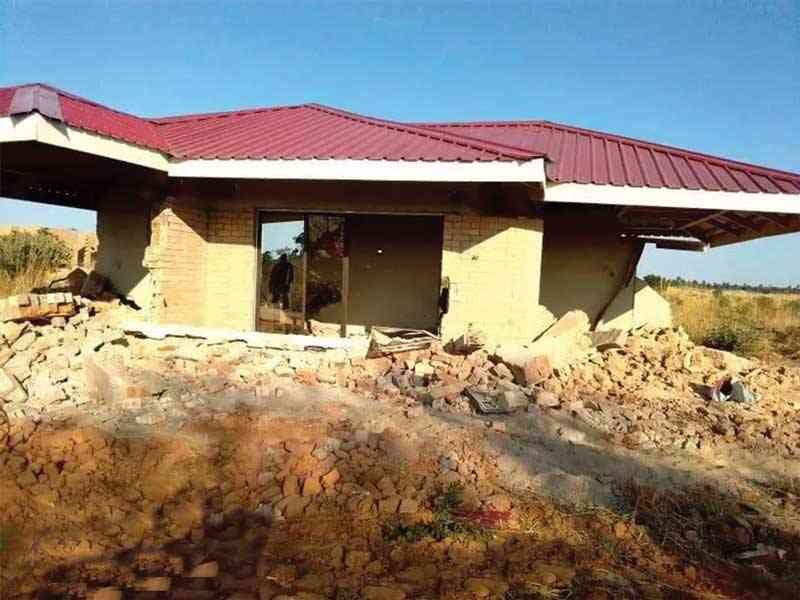
With just a month ahead of the start of the winter season in Zimbabwe, the harsh reality of survival is hitting hard for Gogo Esther and other displaced families in Harare’s Retreat and Waterfalls areas
Stripped of their homes and possessions after the demolition of over 300 illegal structures, they find themselves without shelter as winter beckons.
The demolitions took place in October last year to allow Emmanuel Makandiwa’s United Family International Church (UFIC) to occupy the land, which the families had been allocated by suspected Zanu PF-linked land barons.
With no alternative accommodation, some families settled at an open space about half a kilometre from where their homes used to be.
“When our houses were demolished, some found alternative shelter and moved on, but some of us have no means and we have remained settled here,” the elderly woman said.
As the 17 families grapple with their dire circumstances, Gogo Esther and other women are forced to scavenge for fabrics in dumpsites, hoping to piece together makeshift duvets to shield themselves from the biting cold.
This publication’s visit to Retreat exposed the dire state of living conditions for the displaced families.
After meandering through subserviced streets of Retreat, the crew arrived at the open space, referred to as Pamachurch, where Gogo Esther and other families are living.
- Makandiwa sings Mnangagwa praises
- Makandiwa sings Mnangagwa praises
- Zim’s quest for FDI leaving communities exposed
- Zim’s quest for FDI leaving communities exposed
Keep Reading
The challenges faced by internally displaced people like Gogo Esther are not just physical, but emotional and psychological as well.
One of the victims, Maria Shoko, said she never imagined herself living in a shack.
“We had big beautiful houses which we had built,” Shoko, who claimed to have been allocated a stand by a Zanu PF-linked land baron, said.
“I came here at Retreat after we were allocated stands by Zanu PF youths.
“Our houses were demolished on October 3, 2023, and for me, what is painful is that this was one week after I had completed building the house.
“We did not approach the youth, who allocated us the land as most of them were also evicted.”
Another victim, who identified herself as Mai Tino, said they had not been given alternative land.
“Some of the people, who were affected relocated to their rural homes,” she said.
“I am 65-years-old and I live with a handicapped grandchild.
“We don’t have any hopes or resources to rebuild.
“We wish that the government at least builds us one room each per family.
“It’s now five months staying here in the open.”
The trauma of losing what have been their homes for the past six years for some, coupled with the uncertainty of their future and the sense of betrayal by those who doled out stands to them, weighs heavily on their hearts.
The story is the same for the women, who are struggling to obtain sanitary pads and other essential sexual and reproductive health facilities.
Without a safe living environment, they are facing challenges in maintaining their menstrual hygiene and accessing proper healthcare.
The lack of privacy and sanitation facilities further exacerbates their predicament, forcing them to make do with whatever limited resources they can find.
The experience of the displaced women in Retreat mirrors that of many displaced women across the country, whose stories are often overlooked when it comes to addressing their sexual and reproductive health needs.
For these women, the absence of proper sexual and reproductive health facilities adds another layer of vulnerability to an already difficult situation.
Children are also some of the most vulnerable victims in Retreat.
The lack of proper shelter, sanitation facilities, and access to healthcare has put their physical well-being at risk, especially when the country is experiencing a wave of cholera and polio.
In addition, the absence of a stable community, support systems, and recreational activities, has further isolated and deprived children of essential social interactions and development opportunities.
The predicament of the displaced in Retreat exposes the inhumane side of the nationwide operation by the government to remove people from rural and urban illegal settlements without giving them alternative shelter.
The government was forced to suspend the evictions following a public outcry.
Zimbabwe’s legislation on land has been described as ambiguous, while at the same time, politicians and land barons have usurped some of the powers of the local authorities and assumed the role of giving out land.
In rural areas, traditional leaders have claimed they are capable of giving out land.
However, the Communal Land Act points out that communal land may also be occupied or used for agricultural or residential purposes only with the consent of the elected rural local government established for the area concerned.










